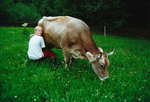
WILKINS Laetitia
- Eco-Evolutionary Interactions, Max Planck Institute for Marine Microbiology, Bremen, Germany
- Bioinformatics dedicated to microbial studies, Genomic and evolutionary studies, Microbe-microbe and microbe-host interactions, Microbial biogeography, Microbiomes
- recommender
Recommendations: 0
Review: 1
Review: 1
Within-species variation in the gut microbiome of medaka (Oryzias latipes) is driven by the interaction of light intensity and genetic background
Getting closer to the host-microbe evolutionary relationship
Recommended by Konstantinos Kormas based on reviews by Laetitia Wilkins, Marco Basili and 1 anonymous reviewerThe issue of whether there is a clear and detectable relationship -either deterministic or stochastic- of fish gut microbiota with evolutionary processes is far from being resolved. Studies on fish microbiota are more perplexed as this animal group includes species both from wild and farmed populations (for food production, ornamental fish and animal models), with variable life cycles and ecophysiologies, and all these features expand the type of interactions to be studied. Based on this biological features variability, multiple methodological limitations, especially for the species with wild populations, are perhaps among of the central reasons for this knowledge gap. Therefore, experimental approaches, which can eliminate some of this variability, seem to be the best approach.
The preprint by Evangelista et al. (2023) entitled "Within-species variation in the gut microbiome of medaka (Oryzias latipes) is driven by the interaction of light intensity and genetic background" is an example of such a targeted study with a freshwater fish species. Due to the paper's finely detailed experimental design, the interdisciplinary skills of the participating co-authors and exhaustive data analysis, this paper manages to draw solid and reproducible results and conclusions. This renders it not only an insightful contribution towards the more general host-microbe interactions in an evolutionary framework, but also a perfect example on how current and future relevant research should be conducted. I feel confident that this paper will assist other scientits of the field to move forward with their current working hypotheses but also to generate novel ones.
Reference :
Evangelista C, Kamenova S, Diaz Pauli B, Sandkjenn J, Vollestad A, Edeline E, Trosvik P, de Muinck E (2023) Within-species variation in the gut microbiome of medaka (Oryzias latipes) is driven by the interaction of light intensity and genetic background. bioRxiv, 2023.02.17.528956, ver. 2 peer-reviewed and recommended by Peer Community in Microbiology. https://doi.org/10.1101/2023.02.17.528956